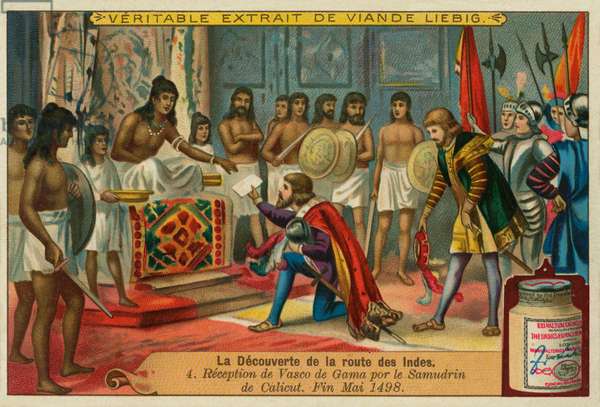The Advent of the Portuguese in India: A Maritime Odyssey
Introduction:
The arrival of the Portuguese in India during the Age of Discovery marked a significant chapter in world history. Led by intrepid explorers like Vasco da Gama, the Portuguese successfully navigated the treacherous waters around the Cape of Good Hope, unlocking a sea route to India that would forever alter the course of global trade.
Portuguese in India through discovery of sea route:
The quest for a direct sea route to India was driven by the desire to bypass the lucrative spice trade controlled by the Venetians and Arab merchants. In 1498, Vasco da Gama, under the patronage of King Manuel I of Portugal, set sail with a fleet of four ships. After a challenging journey around the Cape of Good Hope, Da Gama and his crew finally reached the shores of Calicut (present-day Kozhikode) in southwestern India. The discovery of this sea route not only revolutionized global trade but also established Portugal as a major maritime power.
- Prince Henry of Portugal encouraged voyages for discovery of a sea route to India
- Bartholomew Diaz reached till the Cape of Good Hope, South Africa (in 1487)
- Vasco da Gama reached the port of Calicut on 21 May 1498
- Zamorin was the Hindu ruler of Calicut who warmly received Portuguese
Prominent Governors of Portuguese:
The Portuguese Crown appointed various governors to oversee their interests in India. One of the most notable figures was Afonso de Albuquerque, who served as the second governor of Portuguese India from 1509 to 1515. Albuquerque played a crucial role in expanding Portuguese influence in the Indian Ocean. His strategic vision led to the establishment of a strong Portuguese naval presence and the acquisition of key territories.
Tracing the timeline of Portuguese governors in India provides insights into the dynamic nature of their rule. Some of the prominent governors include Diogo Lopes de Sequeira, who preceded Albuquerque, and later governors such as Lopo Vaz de Sampaio, Nuno da Cunha, and Garcia de Noronha.
- Francisco de Almeida- First governor, famous for Blue Water Policy.
- Alfonso de Albuquerque- real founder; captured Goa from Bijapur sultanate; Goa became capital; captured Malacca, Ceylon and took strategic control of Indian Ocean by controlling Malabar, Ormuz, East Africa and the Red sea; encouraged his countrymen to marry Indian women
- Vasco da Gama became Viceroy for short term.
- Nina da Cunha- acquired Diu, Bassein from Bahadur shah of Gujarat
- Manuel António Vassalo e Silva – Last Governor of Portuguese in India
Trading Stations:
The Portuguese, eager to monopolize the spice trade, established a network of trading stations along the coasts of India. These stations served as key hubs for commerce, diplomacy, and naval operations. Goa, on the west coast, emerged as the epicenter of Portuguese activity in India. In 1510, Afonso de Albuquerque captured Goa from the Bijapur Sultanate, making it the capital of Portuguese India until 1961.
Other notable trading stations included Calicut, Cochin, and Malacca. Calicut, where Vasco da Gama first landed, was an important spice trading center. Cochin, strategically located in the Malabar region, became a vital Portuguese base. Malacca, in present-day Malaysia, was another crucial outpost that facilitated Portuguese control over the maritime routes in the region.
- Goa, Malacca, Calicut, Ceylon, coachin, Diu, Daman, Bassein, Salsette, Bombay, Hoogly
- lost almost all possessions except Goa, Diu and Daman
Decline of the Portuguese:
- Emergence of more powerful trading companies such as British and Dutch
- Rise of local powers like Marathas
- Religious Intolerance- proselyting activities and antagonistic attitude towards Hindu and Muslim, forced conversion to Christianity
- Clandestine Practices in Trade and Piracy
- Discovery of Brazil- It diverted the focus of Portuguese to west
The advent of the Portuguese in India marked a turning point in global trade and geopolitics. Their discovery of a direct sea route to India and the establishment of trading stations along the coast reshaped the dynamics of the Indian Ocean. The Portuguese not only influenced the spice trade but also left a lasting impact on the cultural, social, and economic landscapes of the regions they touched. The legacy of their maritime adventures continues to be felt in the shared history between Portugal and the nations of the Indian subcontinent.
What Portuguese gave to India?
- First printing press in India
- First scientific work on Indian Medicinal Plants
- Military innovations technique like body armour, matchlock men and drilling groups
- Cultivation of tobacco and potato

